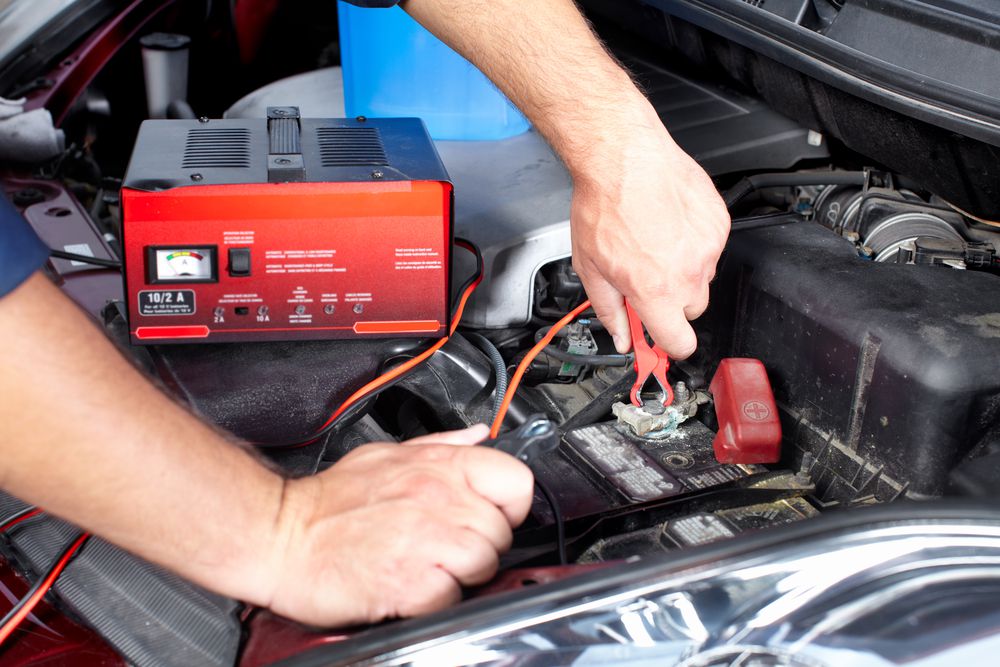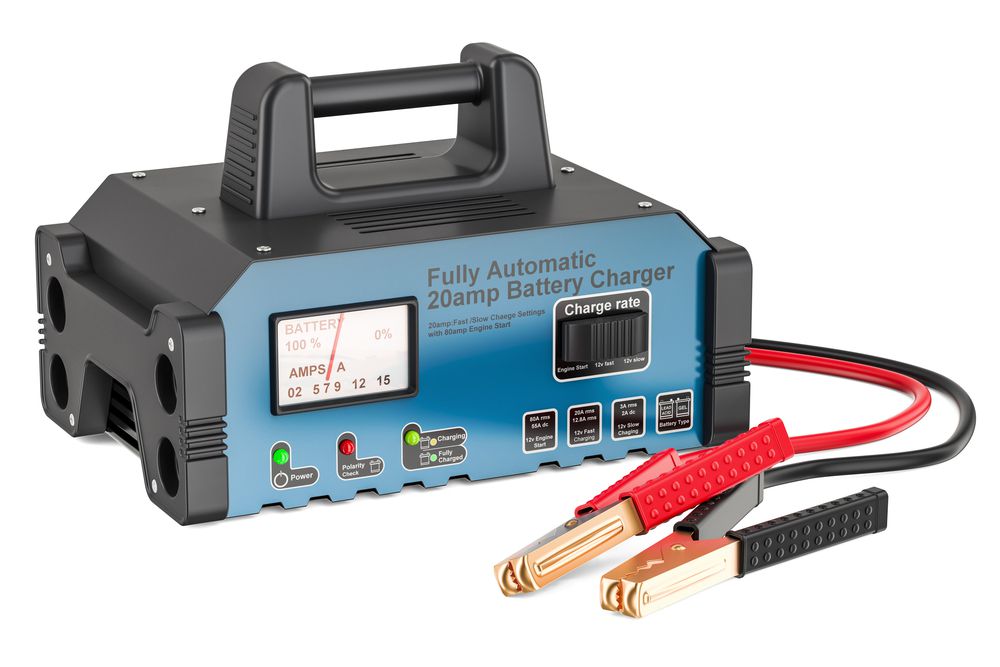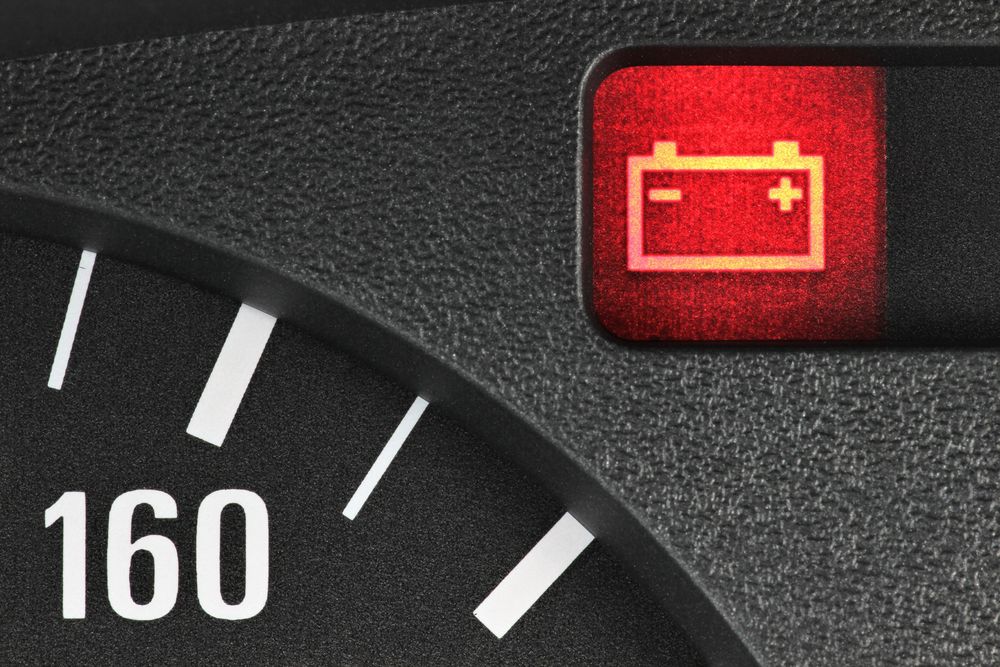Just like any other battery, a car battery needs to charge. If your car's
alternator is not charging the battery, you might consider charging it
externally. So, can you leave a car battery charger on overnight?
Car batteries should be connected to a charger for at most 24 hours at a
time. However, you can leave a car battery charger on overnight, as this is
the estimated time frame required to reach full charge for a car battery.
Charging a car battery overnight is a more convenient charging process.
Car batteries are susceptible, and you must ensure that you care for yours
properly. Proper care and following charging guidelines will ensure
extended battery life.
 Connecting a battery charger to a car battery
Connecting a battery charger to a car battery
What Happens If You Leave A Car Battery Charger On Too Long?
Leaving the battery on charge for too long will cause it to overcharge.
Even if the battery is being charged at a lower voltage (as low as two
amps), it can be overcharged if it's continuously left connected to the
charger.
If you want to charge your car battery safely, you need to make sure that
you follow the manufacturer's guidelines in terms of how long the battery
needs to charge. Charging the battery for too long will cause excessive
gassing when the electrolyte gets hot and oxygen and hydrogen gas are
generated.
This could cause severe damage to older batteries' plates, affecting the
battery's performance. In addition to having the plates exposed, there is
also the risk of the battery bursting and causing damage to anything near
it.
How Long Do You Keep A Battery Charger On A Car?
If you have a completely dead battery, you should be able to charge your
car battery within 10-12 hours fully. However, car owners only need to
charge their car battery for 2-4 hours to start the engine. From there, you
can connect the battery to the engine, and the alternator will charge it
further.
It's essential to keep in mind that charging times will differ depending on
the voltage level and the battery level. Low voltage chargers will take
longer to charge a car battery, but you can invest in fast charging to get
the job done quicker.
Whichever charging system you choose, always take proper precautions and
thoroughly research the charger and battery you're using to narrow down the
correct charging time.
 Car battery trickle charger.
Car battery trickle charger.
Can I Leave A Trickle Charger On Overnight?
Using a trickle charger is one way to ensure that you can safely charge
your battery overnight. Car batteries can be left on a trickle charger for
extended lengths of time and won't be damaged. However, you may find that
it takes much longer to charge than usual.
Some trickle chargers can even keep a car battery at full capacity for
months on end. This is because these chargers won't be using a constant
current, which can prevent overcharging in car batteries over shorter
periods. However, you should still monitor trickle chargers as they can
cause overcharging if they are left on for too long.
Should You Trickle Charge An EV?
Trickle charging for EVs is generally referred to as level one charging.
Electric vehicles need their batteries to be charged to go anywhere, so
charging them correctly is essential, and the battery charging speed is
important. The standard three-pin EV charger often works perfectly, but we
sometimes don't use our cars daily, so we need a way to ensure the battery
is fully charged when the vehicle is required.
If you need to leave your EV at a charging port for extended periods, it's
recommended to use a trickle charger if possible. Trickle chargers are
designed to prevent overcharging in the battery, so they will help to
protect the battery performance of your EV.
Using a slow charger is the preferred method for electric cars. They are
safer to use and less likely to overcharge the battery. Fast chargers might
be convenient, but they're unhealthy for the life cycle of the battery.
Slow chargers tend to work out slightly cheaper than fast chargers.
Can You Overcharge A Battery With A Battery Charger?
You could overcharge a battery with a battery charger in several ways. The
first is misusing battery chargers, using incorrect voltage levels, or
leaving the battery connected to the charger for too long.
Overcharging a car battery will not only cause lost battery performance,
but it can also cause battery sulfation and malfunction. In addition, if
you're not charging your car battery correctly, it will cost you much more
money.
Getting the battery charging process right is crucial. It's much easier to
overcharge a car battery than you might expect, so always follow the
instructions carefully. Charging a car battery is a delicate process, and
you must double-check that you've done everything correctly.
Does Overcharging A Car Battery Damage It?
When a car battery is overcharging, there will be heat generation. The
hotter the battery gets, the more current it draws in, causing it to heat
up further. When the heat accumulation becomes too severe, the battery will
be damaged and could even be destroyed in a matter of hours!
It's often easy to overcharge your car battery, so it's essential to make
sure that you use the correct tools and techniques when charging. For
example, leaving a car battery charging overnight is perfectly fine in most
cases, but it depends on the battery level and the type of charger that
you're using. If you're using fast charging, the battery could overcharge
quicker.
 Car battery warning light on car dashboard.
Car battery warning light on car dashboard.
The safest result of having an overcharged battery is a dead battery.
However, in more extreme cases, the battery could burst due to excessive
gassing, or it could even damage the alternator in your car if you're not
careful.
How Do You Charge A Car Battery Overnight?
There are six steps to safely charging a car battery overnight; all you
need to do is follow the steps below:
-
Use a trickle charger - if you're leaving your car battery charging
overnight, you need to avoid fast charging and use car battery
chargers that can keep your battery safe over extended periods.
-
Clean the terminals - avoid touching the terminals with your bare
hands, as the white powder (sulphuric acid) can burn your skin.
Instead, use sandpaper to clean the terminals correctly.
-
Remove the cell caps - the caps would either be on the top of the
battery or under a yellow strip that you can peel off. You must
remove these before you can start battery charging.
-
Attach the charging cables- connect the red cable to the (red)
positive terminal, and the black cable to the (black) negative
terminal.
-
Turn on the charger - make sure it is connected to a wall socket
and is in a safe area and leave the car battery charging.
-
Leave the car battery overnight - allow the battery to charge
overnight. Then, the following day, turn the charger off and check
the battery level.
Conclusion
Car batteries are susceptible, leaving many car owners wondering: “can you
leave a car battery charger on overnight?” The simple answer is yes, you
can. But you must ensure you use the correct chargers to prevent
overcharging and damaging your car battery.